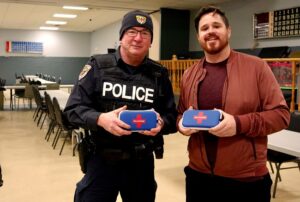Fort William launches National Addictions Awareness Week with information sessions

By Rick Garrick
FORT WILLIAM FIRST NATION — Fort William launched National Addictions Awareness Week with presentations on Naloxone usage and the Good Samaritan Act, 2001 on Nov. 20 at the Fort William First Nation Community Centre.
“Naloxone first and foremost is a lifesaving medication,” says Patrick Jones, adult mental health case manager at Dilico Anishinabek Family Care, noting that Naloxone kits currently contain nasal sprays for overdoses. “You put it in the person’s nose and push the red button, that will deliver the medication. When the medication goes in, it’s going to work pretty fast, within five minutes or so. It’s going to go directly into the blood stream and it’s going to essentially reverse the overdose.”
Jones says some people with an overdose require multiple Naloxone kits to reverse the overdose.
“The strength of these substances on the street are getting stronger,” Jones says. “Sometimes, unfortunately, we are seeing we need multiple kits, four or five, sometimes six kits to reverse this overdose, so that’s why we need lots of them.”
Jones says the Naloxone kits are available at local pharmacies or health centres.
“Every single person in Ontario is allowed up to two of these [kits] per day for free without question,” Jones says. “You walk into a pharmacy, you give them your health card, they can give you up to two kits.”
Jones says the Naloxone kits can also be used for people who have overdosed from their pain management medication.
“You might take too much by accident, so that’s why it’s very important to have these kits nearby,” Jones says.
Anishinabek Police Services Sgt. Rob Pelletier highlighted the benefits of the Good Samaritan Drug Overdose Act, in relation to the Controlled Drugs and Substances Act, and the Good Samaritan Act, 2001 during the National Addictions Awareness Week launch.
“[People] will not be liable or held responsible criminally by providing help to someone that is in need, whether it is someone laying on the ground from an overdose that needs assistance or whether it is yourself,” Pelletier says. “Say you are standing by [a person in need] and you are afraid to call because maybe you have opioids on you, you don’t want to call because you’re afraid that you will be prosecuted or charged criminally. With the [Good Samaritan Drug Overdose Act] under the Controlled Drugs and Substances Act, you are exempt, so you cannot be charged criminally.”
Pelletier adds that under the Good Samaritan Act, 2001, people must only provide first aid assistance within the scope of their ability.
“If someone is unconscious and they are choking and you can’t dislodge it doing the Heimlich Maneuver, you’re not going to do a tracheotomy,” Pelletier says. “You’ve got to keep it within your area of expertise.”
Allie-Joe Pelletier, addiction and mental health worker at Fort William, says they held the National Addictions Awareness Week events to promote addiction awareness.
“We want to teach the community about harm reduction,” Allie-Joe says, noting that the Aftercare event scheduled for Nov. 21 was cancelled due to a funeral in the community. “On Thursday (Nov. 23), we’ve partnered with Dilico and they are putting on a sweat for the community — whoever’s interested will be able to register. There will also be a sacred fire there.”
Allie-Joe says a Youth Night event will be held on Nov. 24, which includes Naloxone training for youth by the Canadian Addiction Treatment Centres, an educational scavenger hunt and games and activities.
“Saturday is our closing night — we will be having a catered dinner which will be traditional with moose meat, wild rice, potatoes,” Allie-Joe says. “[And] we are having an educational bingo.”
Fort William plans to hold an Aftercare program in partnership with Dilico on Dec. 5 and 19 and Jan. 16 and 30 at the Fort William First Nation Community Centre’s Cultural Room.
“They are going to start facilitating Aftercare programs to keep that recovery and maintenance as they go through after finishing treatment,” says Ashley Harju, mental health and addictions worker at Fort William, noting that the program will be facilitated by an Aftercare worker from Dilico. “Anyone who is even thinking about maybe going into treatment, they can see what it’s going to be like. People who have been recovered for many years, they can still attend — it’s like a support group as well.”


